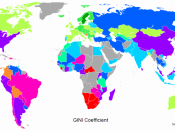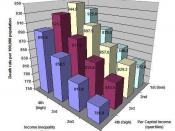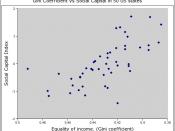During the latest increase in globalization, the world economy has undergone one of its most dynamic expansions in its history. Within the last 15 years, world trade has tripled and the global stock of foreign direct investment (FDI) has quintupled. The number of multinational corporations has also more than doubled, while their holdings around the world have skyrocketed to over 700,000 and the number of patents has reached more than 5.6 million. These numbers translate into higher family incomes, millions of job prospects and unparalleled scientific and human development. As globalization spreads, Gross National Incomes rise and so do income disparities. Generally the inequalities grow because the rich are the first to gain from new forms of investment. The poor and impoverished tend to miss out on the initial benefits and cash flow because they are less likely to be connected to the areas of the economy that receive this new investment, and are more likely to be working in extracting the raw materials of their country, where they work for whatever wages are offered to them just to get by in their everyday lives.
So, while a country's economy may be growing and more money may be available to its people, the rich reap the benefits and the citizens at the lower end of the pay scale tend to stay there while more people fall below the poverty line. Latin America is a region well-known for its inequalities, especially in Chile where the economy has grown substantially since the mid-1980s and income disparities have remained steadily high. Regardless of the relatively unchanging elevated income inequalities, Chile has successfully reduced poverty within its borders. This means that even though the rich keep getting richer, the impoverished are not forgotten and they are also making financial gains through wage increases and...


